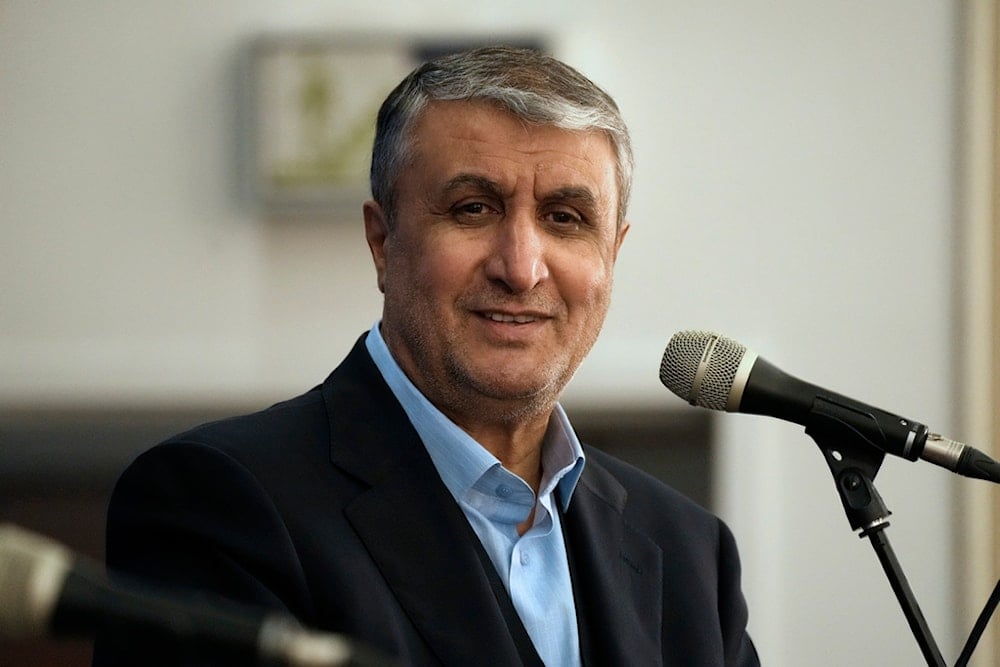Iran reaffirms commitment to IAEA inspections, no obstacles ahead
Iran's Atomic Energy Organization head reiterates Tehran's commitment to IAEA inspections, acknowledging an increase in monitoring due to expanded nuclear activities.
-

Head of the Atomic Energy Organization of Iran Mohammad Eslami listens during his joint press conference with the International Atomic Energy Agency Director-General in Tehran, Iran, Nov. 14, 2024. (AP)
The head of the Atomic Energy Organization of Iran (AEOI), Mohammad Eslami, reaffirmed that Tehran has not and will not obstruct inspections of its nuclear facilities by the International Atomic Energy Agency (IAEA).
"The relationship between Iran and the IAEA is within the framework of safeguards and the NPT [Non-Proliferation Treaty]," Eslami said after visiting a nuclear exhibition on Saturday.
"To date, the agency has always had access for its monitoring within the framework of safeguards and NPT, and we have not created and will not create any obstacles for it," he asserted.
Eslami acknowledged that Iran has allowed more inspections, stating, "We have increased capacity. It is natural that the number of inspections should also increase."
His remarks followed an IAEA report indicating Iran’s agreement to boost monitoring. "When we carry out nuclear activities, and where we deal with nuclear materials, changing the scale will naturally change the monitoring level," Eslami explained.
"When, for instance, three units become five units, it is only natural that the level of oversight increases proportionately."
Head of Iran's atomic agency orders activation of new centrifuges
Last month, Eslami directed the activation of a new and advanced series of centrifuges in response to the resolution adopted by the International Atomic Energy Agency (IAEA), which criticized Tehran for what it described as a lack of cooperation.
In a joint statement with Iran's Ministry of Foreign Affairs, the Atomic Energy Organization of Iran (AEOI) stated that the decision by the IAEA Board of Governors was made under pressure from the European Troika, which includes Britain, Germany, and France, and the United States, describing this approach as "destructive."
Both the ministry and the agency emphasized that such a destructive approach would negatively impact the positive atmosphere between Iran and the IAEA, as well as the understandings achieved between the two sides.
"It is clear, these measures are being taken in order to protect the country's interests and further develop the peaceful nuclear industry, in line with the growing national needs and within the framework of Iran's rights and obligations under the Comprehensive Safeguards Agreement," the statement pointed out regarding Eslami's decision.
At the same time, the joint statement affirmed that "technical and safeguards cooperation with the IAEA will continue, as in the past, within the framework of the Safeguards Agreement."
It added that "Iran remains ready for constructive engagement with relevant parties based on international legal principles and standards," stressing that "the principled policy of protecting the rights and interests of the great Iranian nation and developing a peaceful and indigenous nuclear program will continue with seriousness."
The IAEA resolution, introduced by Britain, France, Germany, and the United States to the agency’s 35-nation board, follows a similar measure passed in June.
China, Russia, and Burkina Faso opposed the motion, which was adopted with 19 votes in favor, 12 abstentions, and Venezuela abstaining from participation, according to two diplomats who spoke to AFP.
The confidential resolution, reviewed by AFP, emphasizes the "essential and urgent" need for Iran to "act to fulfill its legal obligations."
It also urges Tehran to provide "technically credible explanations" regarding uranium particles allegedly detected at two undeclared sites within the country.

 3 Min Read
3 Min Read








